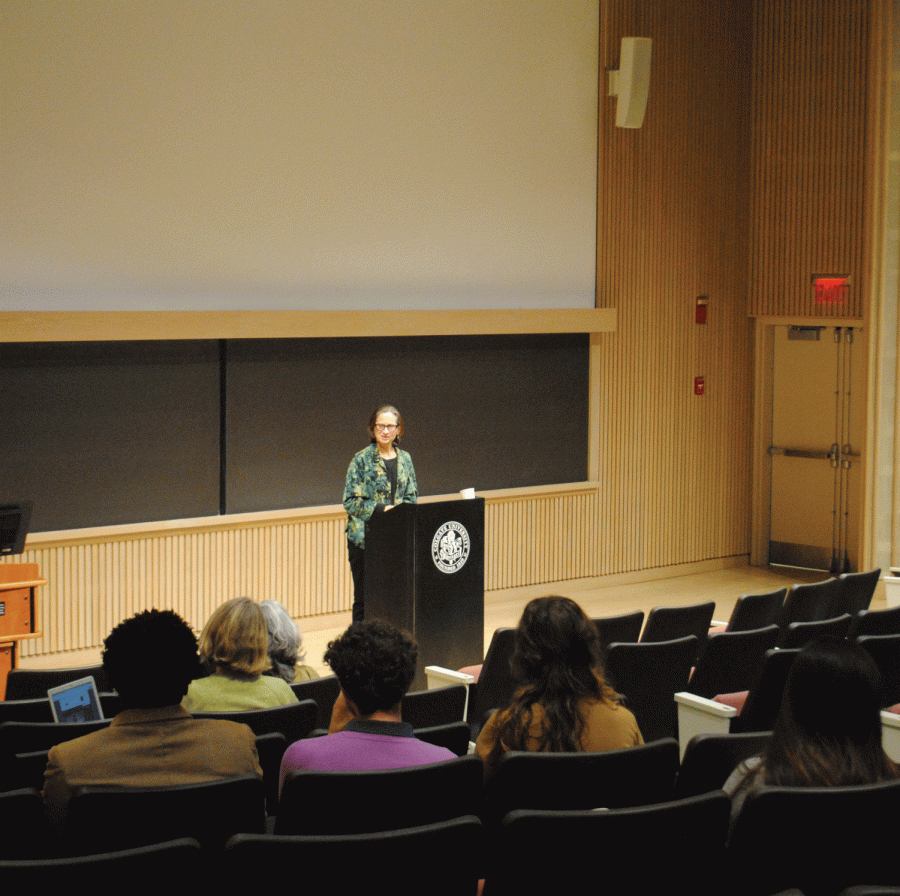Author Lydia Davis Challenges the Need for Deeper Meaning in Writing
Colgate’s Living Writers series is well underway. Thursday, October 20, students, faculty and townspeople gathered in Love Auditorium to hear Lydia Davis read samples of her work. Davis is the author of six story collections and an acclaimed translator of French literature written by Marcel Proust and Gustave Flaubert.
Davis is the sixth author to come to Colgate through the series, but her work stands out for its brevity. The students taking the course were assigned Davis’ collection of stories “Can’t and Won’t,” published in 2014. Professor Brice, who teaches the Living Writers course, introduced Davis and pointed to the range of length in her collection; the longest story is 28 pages long and the shortest is just a sentence.
Davis began by reading stories from “Can’t and Won’t,” which included letters of complaint about a bag of frozen peas, conversations between spouses, glimpses into wildlife and scenes of travel. As she read, Davis gave insight into her own writing process. One of her strategies as a writer is to keep a notebook with her at all times when she is traveling in case she is attracted to a scene by language or behavior. Davis was also interested in how she and other writers can expand a single sentence under pressure.
“When you’re pressed, you can give more in an interesting way,” Davis said.
In the question and answer session after the reading, a faculty member asked Davis about how her work translating the French author Marcel Proust informed her own writing in the short story form. Davis responded that although Proust’s novel was around 3,000 pages, he saw his own work as concise.
“He doesn’t waste words,” Davis said.
This is something that she strives for with her spare language.
Given some of her stories are as short as a sentence, students were curious about the use of subtext. Senior Brett Goldberg asked about
subtext in one of Davis’ stories entitled “Housekeeping Observation.” This story, in which in a narrator observes that underneath the dirt, the floor is really clean, is just a sentence long. Davis denied consciously using any sort of subtext.
“I’m not that clever. I’m not really deliberately manipulating anything,” Davis said.
Hearing Davis speak about this story changed the way that senior Corryn Wetzel thinks about the collection.
“When I read her book again, or continue on to other pieces by Davis, I’ll remember that sometimes there isn’t intended to be a deeper meaning. Sometimes you should just take a story for what it is. Davis didn’t try to pretend that a story about dirty floors was a deeper comment on society, suppressed emotion or the human condition. As students, we’re so trained to look for the ‘deeper meaning’ of something, and Davis reminded us that, sometimes, there isn’t one,” Wetzel said.
Students were also struck by Davis’ distinct style and narrative voice.
“The narrators may be reserved, and sometimes even confused, but their stories are unapologetically Lydia Davis,” senior Jia Bao Lei said.
Regardless of how audience members made sense of the stories in the collection, no one could deny the uniqueness of the Davis’ writing.






